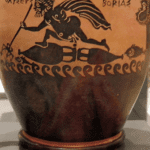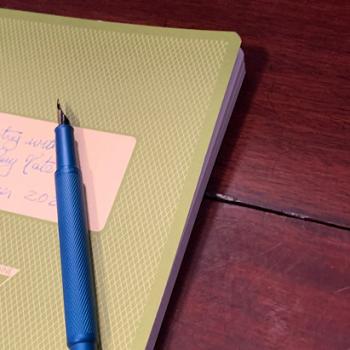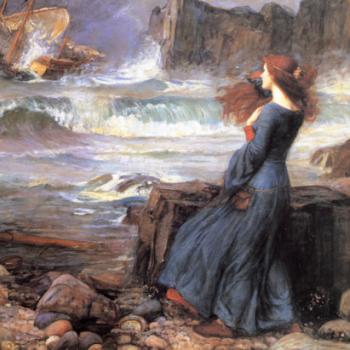I have known men who were most at home in the woods. They know the patterns of nature and were never happier than when following those patterns. They live in the seasons. I have friends who are only comfortable when in the city, immersed with people, and they are highly skilled at telling me what is happening in society.
Education tends to one or the other direction: country or town, nature or civilization. Yet civilization we are told has her discontents and nature can be brutal, destroying. During Harvey, I saw that both civilization and cruel nature could fail my family. We were between a close downed grocery store and a rising levee. My reading during Harvey was Homer and his Odyssey, full of the sea was particularly appropriate.
How can we make whole people: familiar with nature and builders of civilization.

Homer begins his Odyssey with his hero stuck in a cave with a goddess. This cave seems the ultimate man cave, but Odysseus is miserable. He has every pleasure, but he is torn apart in his soul with desire for home. The hero sits by the sea every day and weeps, because he cannot escape. Nightly, he is assaulted by passion and he cannot get free. The cave is killing him with pleasure, gentle, sweet, endlessly killing his soul and if he cannot escape, then he will be alone with desire for the rest of time.
God help us.
Finally, divine intervention saves him, that is about all that can free us from Calypso, and he is cast onto the sea. Odysseus survives, but reaches land a human wreck looking for a place to rest. He finds a new kind of cave:
He set out for the woods and not far from the water found a grove with a clearing all around and crawled beneath two bushy olives sprung from the same root, one olive wild, the other well-bred stock. No sodden gusty winds could ever pierce them, 530 nor could the sun’s sharp rays invade their depths, nor could a downpour drench them through and through, so dense they grew together, tangling side-by-side.*
This is key passage to understanding what Homer thinks makes a flawed Odysseus the Man of Book I, line 1. Odysseus comes to rest in a place formed from the natural olive tree and the cultivated olive tree. They are intertwined so tightly that they can protect him from all harm. Civilization has cultivated the fruit bearing olive tree and nature has made the hardy plant that together are stronger than they would be apart.
The next day Odysseus is born from this womb and he is renewed in strength and purpose. The obvious lesson is we need the natural or wild impulses and civilization. The city risks getting cut off from nature while the natural world is not enough for people. We are made to make so we need more than the rough, ready materials that nature provides us. The hero, the man who can survive, finds good in a unification of nature and civilization.
That much is obvious, but Homer is brilliant so he takes it further. The bush where Odysseus sleeps shields him from nature, wind, sun, and rain, the forces of nature. It provides external safety, but more is a place of rest from the turmoil the hero brings with him. Odysseus brings civilization in with him, but he is exhausted. He has done his duty at Troy, ten hard years of war, and then been on a seemingly endless trip home. Greek civilization has failed Odysseus. The trickster has run his last con. He is tired, beaten down by monsters and men, but in this unusual place where the natural olive and the cultivated tree are united, he finds rest.
A good education creates the haven where both nature and civilization are recognized. Nature provides resources, but is not just tools. Nature exists and is not just reducible to some parts we need. She is a the good creation of the good Creator. Civilization is artificial and so often flawed, but a good civilization creates the ground for justice and mercy. Nature is, while civilization has the promise of making what should be reality. Practically, education should be outside as much as possible and never lose track of matter, energy, and the form of the cosmos as they are. Such a person must also learn to use technology, appreciate the arts, and build something new.
If both of these are woven together, when nature and the city have gotten us down, we have a home.
We can rest in that.
————————-
*Homer. The Odyssey (Penguin Classics Deluxe Editio) (p. 167). Penguin Group. Kindle Edition.












